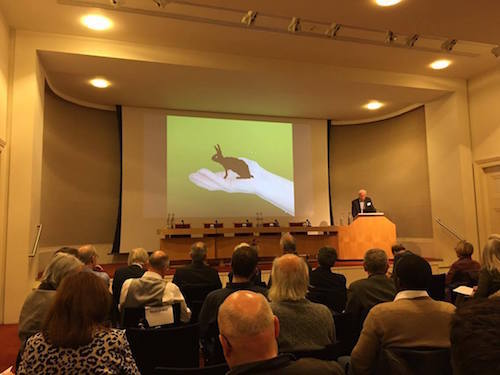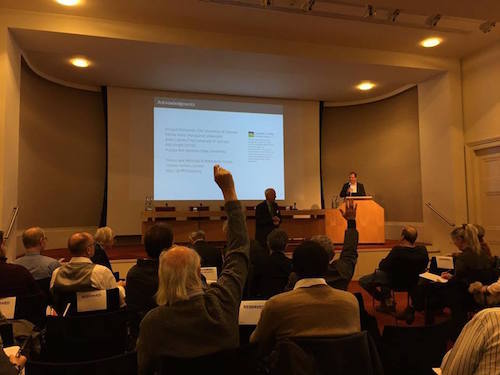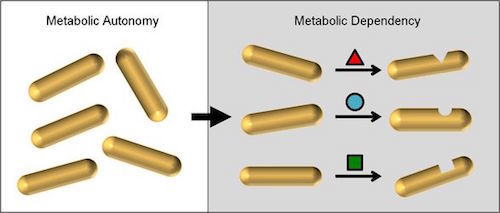Discovery Institute's Blog, page 25
November 11, 2016
Royal Society Meeting Not Provocative Enough for You?
A colleague walking the halls at Discovery Institute in Seattle offers a blunt assessment of the proceedings at the Royal Society in London: "It sounds like it was a dud." Another comments by email, "Except for an occasional outburst (such as [Eva Jablonka's] "Not God -- we're excluding God"), it sounds as though it was quite boring." Well, that's admittedly second-hand.
As I began receiving reports from friendly scientists in the crowd, I had been expecting news of orthodox neo-Darwinists a...
RS Meeting Not Provocative Enough for You? The Action Shifts Tomorrow to Cambridge University

A colleague walking the halls at Discovery Institute in Seattle offers a blunt assessment of the proceedings at the Royal Society in London: "It sounds like it was a dud." Another comments by email, "Except for an occasional outburst (such as [Eva Jablonka's] "Not God -- we're excluding God"), it sounds as though it was quite boring." Well, that's admittedly second-hand.
As I began receiving reports from friendly scientists in the crowd, I had been expecting news of orthodox neo-Darwinists a...
Pictures from an Exhibition (of Evolution Views)

Actually, from reports by our informants in the room, the views at the Royal Society meeting on "New Trends in Evolutionary Biology" fell short of the exhibition of robust diversity that we expected. The conference is now concluded, but one ID-friendly scientist turned out to be a fiend with his iPhone camera and sent me more photos than I know what to do with.
The problem is privacy. We bend over backward to respect it, owing to concerns that scientists, if outed, will be punished for unor...
From a Confidential Informant, Notes on Day 2 of the Royal Society Meeting

This week's Royal Society meeting in London on "New Trends in Evolutionary Biology" has now concluded. An ID scientist in the audience offered his notes on Day 2. Note his succinct running commentary. Very helpful.
Following a brief introduction by Denis Noble, the first talk was by James Shapiro about natural genetic engineering (read-write genome innovations). Most interesting finding: Non-coding DNA elements correlate with organismal complexity (distinct cell types) and are not functionle...
November 10, 2016
The Importance of Research on Monkeys

Animal rights activists, and others who don't quite fit that label, such as Matthew Scully, excoriate scientists for conducting research on animals.
Some go so far as to call researchers sadistic, torturers, and other such calumnies. PETA animal rightists often lie by claiming no human good comes from such research.
But without research on monkeys, rats, and other animals, much human suffering would never be ameliorated, because sometimes researchers just need to use a living animal before s...
Best of Behe: A Quick Reprise of The Edge of Evolution
Editor's note: In celebration of the 20th anniversary of biochemist Michael Behe's pathbreaking book Darwin's Black Box and the release of the new documentary Revolutionary: Michael Behe and the Mystery of Molecular Machines, we are highlighting some of Behe's "greatest hits." The following was published here on August 20, 2014. Remember to get your copy of Revolutionary now! See the trailer here.
On his blog, Sandwalk, University of Toronto biochemistry professor Laurence Moran expressed un...
Pattern Formation Explained by Evolution? Not So Fast

Few are the scientific papers that try to explain animal patterns: zebra stripes, butterfly colors, the beautiful designs on tropical fish. The mathematical precision of plant spirals, called phyllotaxis, shouts for explanation. Unquestionably, genes are involved, but where did the genes come from? Why do they turn on and off in specific ways to produce patterns? How are these to be explained by unguided material processes? A few recent papers try to answer these questions, sometimes erring...
November 9, 2016
More Evolution by Breaking Stuff

Building things -- major novelties, complex wonders, splendid inventions -- that's the problem Darwinism can't solve. But evolving advantages by tossing abilities aside, yes that's something unguided processes are capable of doing. Evolution is a fact, as they always tell us, but it hasn't been shown to have the inventor's touch.
In a study published in PLOS Genetics, scientists at the Max Planck Institute for Chemical Ecology in Germany have demonstrated that again ("Dependency can be an ev...
Crowd Effect: Evolution Stays Afloat by Dint of Sociology

It's the crowd effect: Certainties like Darwinian evolution stay afloat by dint of sociology as much as science or anything else. On a new episode of ID the Future with Andrew McDiarmid, protein chemist Douglas Axe talks about his new book Undeniable: How Biology Confirms Our Intuition That Life Is Designed and the illusion that just because a lot of people say something, that makes it true:
People tend to follow other people. That's the way we are as humans. So there've been lots of ideas t...
Intelligent Design Is Testable. Is Darwinism?

A familiar canard is that intelligent design isn't science because it makes no empirically testable claims or predictions. The objection is a canard because intelligent design makes many empirically testable claims and predictions.
Consider Darwin's Black Box, published twenty years ago as we recall in the new documentary Revolutionary. In the book, molecular biologist Michael Behe points out that the neo-Darwinian mechanism lacks foresight. It requires a functional system at each mutational...
Discovery Institute's Blog
- Discovery Institute's profile
- 15 followers





